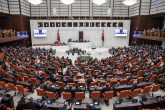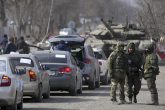After two weeks of intense diplomacy and long negotiations with the two superpowers of the world separately, Turkey finally reached an agreement about northern Syria. Since the beginning of the armed conflicts and the rise of Daesh, we have seen that Turkish authorities emphasized the potential impact of this conflict and the U.S. cooperation with the People’s Protection Units (YPG) for the national security of the country.
Especially on its southern border, due to the emergence of two states with civil wars, we have seen a serious security risk for Turkey. With the rise of Daesh and the resurgence of the PKK in the region, the country became the target of two terrorist groups at the same time. The establishment of security mechanisms on the border, including walls, barbed wire and drone patrols partly resolved this problem.
The increasing capacity of terrorist groups to trespass this border and the rising number of the terrorist attacks have demonstrated that with a terrorist-controlled area in the south of the border, in which the terrorists started to establish a statelet that will be the main ground for recruitment, finance and training activities, it will be impossible to provide long-term safety on the border and the security of the country. This is particularly the case when these terrorist groups, both Daesh and the PKK in this case, indicated that Turkey is the biggest enemy in their publications.
The Turkish incursion to northern Syria and the diplomatic traffic of the last two weeks provided an interim solution for the problem. This solution, together with Turkey’s earlier operations in Jarablus and Afrin ascertain that there will be no terrorist-controlled areas in the territories adjacent to Turkish-Syrian border.
During the latest operations, when the PKK demonstrated its ability to attack to the villages on the border areas with missiles, it was shown how urgent and high the risk was for Turkey. Following these agreements between Turkey and the U.S. and Turkey and Russia, the Turkish government will closely watch the activities and withdrawal of the YPG members from the areas designated in these accords.
In the aftermath of the YPG withdrawal process, there needs to be stabilization work that would entail the establishment of local authorities and policing in the area. In particular, in the areas of the latest Turkish operation, Turkey aims to start the reconstruction process that can provide for the safe return of some of the refugees to their homeland. As highlighted by the Turkish authorities: to provide the enduring defeat of Daesh in the region will constitute one of the top priorities as well. Given the threats it poses to the security of the residents of Turkey and Syria and the stability of the region, there will always be a focus on fighting this group. In the meantime there will be a continuation of the efforts to find a political solution for the conflict in Syria.
It is important to understand that outside of the designated areas, the YPG and its elements continue to be terrorist group for Turkey. The fact that they withdrew from the 32 kilometer line will not change the reality that this group is Marxist-Leninist terrorist group, whose goals entail targeting the territorial integrity and national security of Turkey, a NATO ally, and which has been building its capacity through the arming and training they received from the U.S.
They continue to be priority for Turkey in providing security to its citizens. Their cooperation with the U.S. continues to be an irritant in bilateral relations. Any activity by this group against Turkey will trigger operations against it. This point needs to be understood by the U.S. authorities in the coming negotiations with Turkey in order to acquire a more stable working relationship with Turkey in Syria and beyond.
[Daily Sabah, 26 October 2019]
In this article
- Opinion
- CENTCOM
- DAESH
- Daily Sabah
- Donald Trump
- East of the Euphrates
- Fight against DAESH
- Kurdistan Workers' Party Terrorist Organization (PKK)
- Middle East
- NATO
- NATO Ally
- Operation Euphrates Shield
- Peace Corridor
- People's Protection Units (YPG)
- PKK - YPG - SDF - PYD - YPJ - SDG - HBDH - HPG - KCK - PJAK - TAK - YBŞ
- Russia
- Safe Zone
- Superpower
- Syria
- Syrian Civil War
- Syrian Conflict
- Syrian Crisis
- Syrian Democratic Forces (SDF)
- Syrian National Army (SNA)
- Syrian National Coalition
- Syrian Opposition
- Syrian Refugees
- Terrorism
- Trump’s Syria Withdrawal
- Turkish Foreign Policy
- Turkish-American Relations
- Türkiye-US Relations
- Türkiye-US Security Relations
- Türkiye's Foreign Policy
- Türkiye's Operation Peace Spring
- Türkiye’s Operation Olive Branch
- United States (US)
- US Withdrawal from Syria
- US-PKK/PYD/YPG/SDF Relations
- US-Terror Relations
- Vladimir Putin



